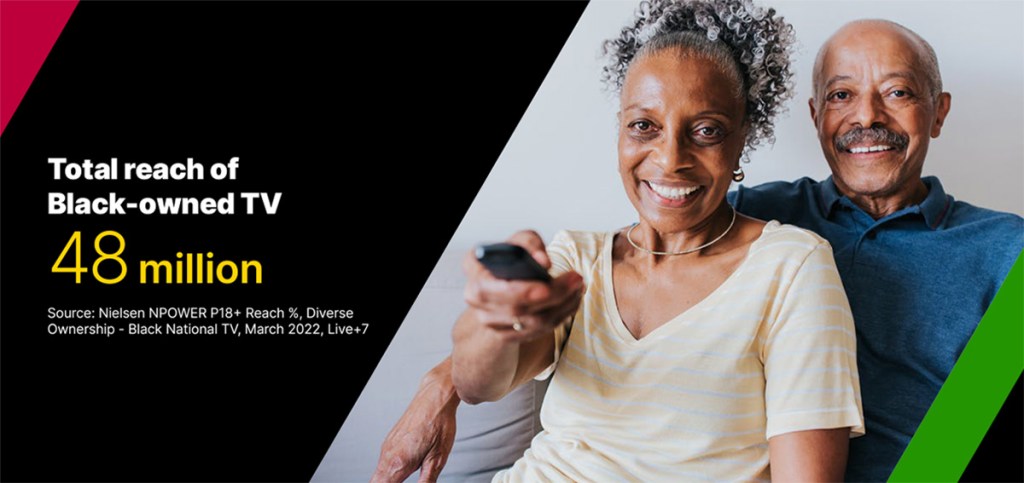While most conversations on representation in media are centered around what audiences see on screen, of growing importance to viewers—and growing influence in attracting new audiences—is diversity and inclusion behind the cameras.
Diverse talent in roles such as producers, directors and writers shape media content that is more nuanced, accurate and inclusive. But the lack of Black and Hispanic off-camera representation is glaring. According to the Writers Guild of America, in 2020 Black writers made up only 15.5% of TV series writers, 9.7% of plot writers and 7% of screenwriters. And a recent Nielsen study in collaboration with the Latino Donor Collaborative found that just 8% of the 530 most-popular streaming programs have behind-the-camera Hispanic representation.
Audiences looking for representation on both sides of the camera are increasingly turning to diverse-owned media outlets. These broadcasters, networks and publishers deliver an impressive reach across the U.S., but that’s not where their influence ends. While diverse-owned networks are more likely to attract Black and Hispanic viewers, advertising on diverse-owned media can also extend reach to other audiences, especially if those audiences crave inclusive content. And they do.
This year, 53% of overall viewers are more likely to watch inclusive content, up 13% from 20211. And these viewers are also spending more time with diverse-owned networks. On national television, for instance, all viewers watched more than 140 million hours of content from Black-owned networks in March 2022―double what Black audiences alone watched2.

With a reach of more than 48 million viewers in March 2022, brands and advertisers not investing in Black-owned outlets are missing out on both the opportunity to reach more of their target audience, and to market to new audiences interested in diverse content.

For viewers of Latino-led content, off-camera representation translates to increased bingeability and new audience retention. Our collaboration with Latino Donor Collaborative evaluated the relationship between behind-the-camera representation and Nielsen Gracenote’s new bingeability scores among the most-streamed content of the past year.
We found that Hispanic talent contribution to bingeable content is significant. Out of the top streaming programs in 2021, 134 had bingeability scores of 3 or higher, or highly bingeable. Of the top bingeable content, Hispanic talent has a significant contribution to the production of a show, as 56 of these 134 programs feature Hispanic representation on at least one side of the camera.
Also of note, our analysis found that Latino-led content amplifies the value of streaming platforms because, while audiences came for inclusive content, they stayed to watch more than their original program choice. This signals an opportunity for advertisers to draw in new audiences—and keep them longer—by centering diverse talent both on- and off-camera.
Despite the exceptional performance of content that features Black and Hispanic talent behind-the-scenes, representation across the industry remains low. Brands and advertisers can change these disparities by proactively seeking out partnerships with diverse-owned media outlets and investing with content and platforms that center diversity at every stage of production. These partnerships offer a way for brands to be a champion for cultural equity while expanding their reach to new audiences and becoming a name consumers associate with inclusion.
For more insights, download Amplifying Black voices in media: Creating informed, thoughtful and authentic experiences and Latino-led content and viewers: The building blocks for streaming’s success.
Notes
- Attitudes on Representation on TV Study, April 2022
- Nielsen Diverse-Owned Media report, February 2022



